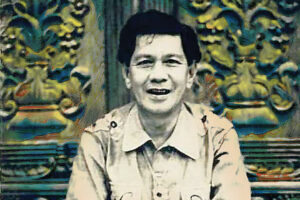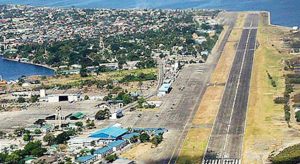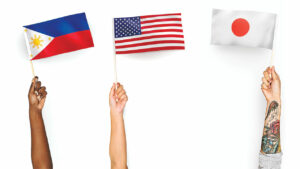The straight-talking Nick Joaquin

“We glance at the state and say that politically, we are a failed society. We study the prices and say that economically, we are a bankrupt society. We peruse the crime figures and say that spiritually, we are a violent society. We devour the latest scandals and say that, morally, we are a sick society.”
That is Nick Joaquin (1917-2004) Filipino writer and journalist, National Artist of the Philippines for Literature, speaking to us in his book, Culture and History, a collection of 15 essays written in various decades, some from the 1960s but collected and first published in 1988.
“The reason we have no clear picture of today is that we’re always being offered a political picture — good or bad, according to which faction is the painter — or an economic picture, again either happy or gloomy, according to which statistics are quoted. But a nation is not its politics or economics. A nation is people. And a nation changes only when people change.” Joaquin speaks in “the seething mid-60s” of a society in “the delirium of fever” with changes in the world and in the country.
“We are so fearful and so furious today because that society has exploded from under our feet; we are up in the air; and nothing will ever be fixed again: not prices, nor morals, nor ideas, nor creeds.” Joaquin might as well be scolding us today, in 2024.
Perhaps only a straight-talking Nick Joaquin, both feared and loved, can get away with “Filipino-bashing” that ordinary mortals might not attempt against the super-sensitive amor propio of the Filipino.
“Are we not confusing timidity for humility and making a virtue of what may be the worst of our vices? Is not our timorous clinging to smallness the bondage we must break if we are ever to inherit the earth and be free, independent, progressive,” he asks?
“Society for the Filipino is a small rowboat: the barangay. Society for the Filipino is a small locality: the barrio. History for the Filipino is a small, vague saying: Matanda pa kay Mahoma (some distant, undated past). Enterprise for a Filipino is a small stall: the sari-sari store. Industry and production for the Filipino are the small immediate scratchings of each day: Isang kahig, isang tuka. And commerce for the Filipino is the very smallest degree of retail: the tingi.”
Do we wonder then that the Philippine Revolution did not happen in a big way — not against the Spaniards, and not against the Americans. Independence was given, not really “won.” “Two small tribes — the Tagalog and the Pampango — carried out the Revolution called Philippine, because they were the most ‘politicized’ among our tribes. And the history that has become the national culture was chiefly created by one social class, which may be identified as middle class, petite bourgeoisie, landed gentry, principalia, ilustrado…”
Is this not so uncannily similar to the 1986 EDSA People Power Revolution, 90 years after the Katipunan Revolution for Independence? Led by the middle class (what Joaquin calls “the effective minority”), both these revolutions were thereafter recognized and accepted by the less-involved majority. These revolutions galvanized national identity and reinforced values and mores that defined the culture of society. Thus, the interplay of culture and history, history and culture.
But more than revolutions, evolutions are the more meaningful, more permanent “transitions” in culture and history. “We are all agreed that we have to change our basic viewpoints and attitudes if we are to become more progressive and dynamic; at the same time we fear the dynamics of change, we dislike the risks and uncertainties that the modern industrial nations have accepted as a way of life.”
“Ours has hitherto been an earthbound, peasant-oriented society. Our values were peasant-values; our attitudes, peasant attitudes. It’s not merely sentimentality that impels us (the politicians specially) to glorify the peasant and profess an obsession over his lot; we think thus to preserve the peasant society which is a static society, because we long for security. But the revolution we are now engaged in is against peasantness: against routine meekness, resignation, fatalism, and provincialism. To change, we have to kill the peasant in us, because it is the peasant mentality that has kept us earthbound, mean and poor through the ages.”
Enough of cry-cry in sad Filipino movies! But Manong Nick, global mass and social media in the new technologies have made accessible offerings of radically changed form and substance of art and communications — and drastically or slowly changed cultures to near homogenization. Values are changing, if ever so vigilantly watched by spiritual leaders and by principled social and political leaders, and hopefully controlled at the most basic formative level of the family.
And wars and other forms of conquest still pit nation against nation, as conflicts tear communities, groups, and individuals apart. Events in history can only whisper behind the curtain, gossip and speculate on what changes these have done to the human soul.
Dr. Martin Luther King, Jr. in a sermon from his book Strength to Love (1963) said, “We are not makers of history; we are made by history.”
“Before 1521 we could have been anything and everything not Filipino; after 1565 we can be nothing but Filipino,” Nick Joaquin said.
“The colonial years were the process through which our nation achieved that integrity of being when history and culture, form and substance, become a whole from which none of its components can be removed, because the least factor is essential to the question,” Nick Joaquin says.
We are what we are now because of our past.
We can be better in the future.
Amelia H. C. Ylagan is a doctor of Business Administration from the University of the Philippines.




